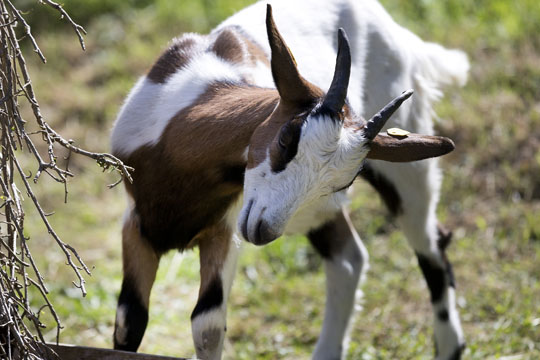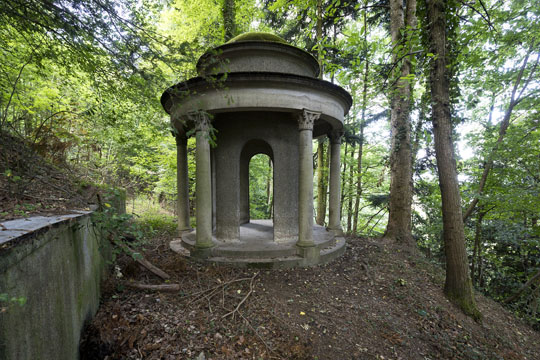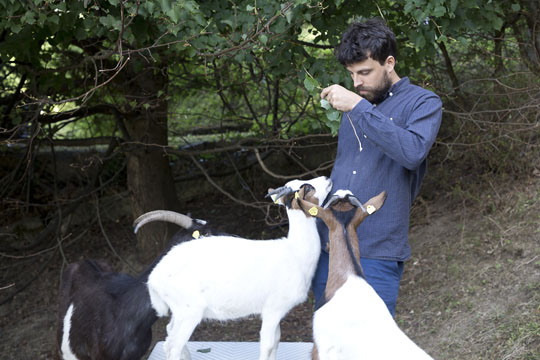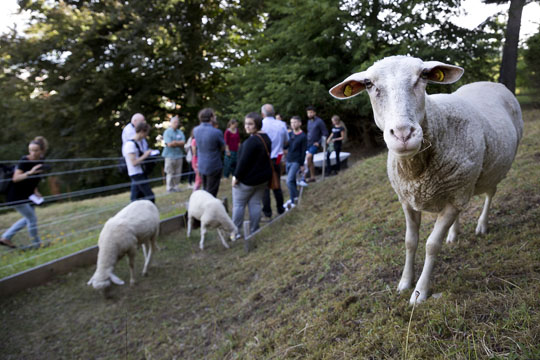Animal custodians of the countryside
Freiburg, Aug 31, 2017
"Hello!" cries Nicolas Schoof, moving two electric fence wires aside and entering the meadow – a slope on Freiburg's castle hill, grassland below, forest above. Peace and quiet. Then a black goat stretches its neck out between the trees, glances around and struts down the slope to meet the visitors. Frauke is the alpha. A few moments later four more goats follow her down. "That's the herd instinct," says Schoof and smiles. But all the same the PhD student from the Faculty of Environment and Natural Resources of the University of Freiburg hasn't gathered all his flock yet. So off we go into the woods.
 The animals have nibbled the bark off many trees and eaten up small shoots. In the long term it is hoped that this will once again create a habitat for species which still find it too dark here at the moment.
The animals have nibbled the bark off many trees and eaten up small shoots. In the long term it is hoped that this will once again create a habitat for species which still find it too dark here at the moment.
Photo: Jürgen Gocke
In the woods we find an old pagoda from the days when the area was still a park. In the shade lounging on the cool stone, three sheep chew the cud at their ease. So now they are all there, the eight custodians of the countryside working on behalf of conservation, research and teaching: this cooperation project with the Further Education Academy of the German Caritas Association that owns the area is expected to show the long term changes from grazing to flora and fauna, as part of its teaching work. The herd includes Waldschafe, a longwool breed of sheep, Tauernscheck goats and one Nera Verzasca goat – all farm animals at risk of extinction.

In the woods we find an old pagoda from the days when the area was still a park.
Photo: Jürgen Gocke
Brambles beat stinging nettles
"I'm actively engaged in conservation, and so I had the idea of initiating a project at the University of Freiburg as well," says Schoof. In June 2016 he found the right partner: Dr. Dirk Sichelschmidt, Deputy Director of the Further Education Academy and as such responsible amongst other things for its quality and environmental management. He was immediately attracted by the idea. In addition, the Student Council of the University of Freiburg gave the grazing project funding of EUR 1,700 and with it financed the electric fence that is powered by solar panels as well as the purchase of the animals from an adventure farm in Neckartal.
Even before they arrived, students recorded the vegetation on the site, in order to be able to compare data later. The meadow of almost waist-high grass and moss almost completely covering the ground was already starting to turn into forest – if it had been left untended, in just a few years shrubs and trees would have been growing. The forest itself had hollow trunks and dead wood which offer valuable ecological niches, but as a whole it was too dark there for many species.
Finally in April 2017 everything was ready. "It was lovely to observe how the animals straight away explored everything on the site," remarks Sichelschmidt. They were especially pleased with the brambles, but nettles were less popular. And there were clear changes after just a few weeks: the grass in the meadow now looks as if trimmed with a mower, and the soil has been loosened by hoofs walking on it, giving a chance again to seeds from other plants. Gradually, it is expected that the brambles and moss will recede too and wildflowers which are interesting to insects will start to grow instead. In turn, they could attract animals such as smooth snakes, wall lizards or bats. So species of plants and animals which were originally native here and which are especially valuable for conservation, would return to the site.
 The magic nibbles tree: Nicolas Schoof, the initiator of the grazing project, gives two Tauernscheck goats a delicious treat.
The magic nibbles tree: Nicolas Schoof, the initiator of the grazing project, gives two Tauernscheck goats a delicious treat.
Photo: Jürgen Gocke
In the forest, meanwhile, the animals have nibbled the bark off many trees and eaten up small shoots. In the long term it is hoped that this will once again create a habitat for species which still find it too dark here at the moment – such as cuckoo pint, melick, silver-washed fritillary or the speckled wood butterfly. "The law that no grazing can take place in the forest without special authorization is a real problem from the point of view of conservation," says Schoof. "The animals promote biodiversity in natural ways – it's far better than any habitat care with machinery." Over the coming semesters, he wants to study the long-term changes to flora and fauna in research projects together with his students. Other conservation measures are planned too, which students can also take part in: options include a pond for amphibians, piles of stones for newts or a 'bee hotel'.
An adventure area for guests
But that's not all! "The project is creating a new adventure area for guests of the Further Education Academy and everyone from Freiburg and the region," says Schoof. So far this is especially apparent at the Academy itself, which welcomes around 24,000 guests to conferences and for overnight stays each year. It is part of a pilot group of five Caritas organizations that in June 2017 received the European Union's EMAS certification for environmental management – the grazing project played an important part in this as an example of careful, sustainable management of the land. "The animals are very much enjoyed by our guests as well as by our staff, and give rise to a wide variety of reactions," comments Sichelschmidt. Amongst other things, he is planning to survey guests to gather more detailed information about their experience of the environment.
"The meadow is a small example of how we can demonstrate that in conservation and cultural terms the arduous and economically barely recognized work of shepherds and goatherds is incredibly valuable," says Schoof. The team wants to install information boards to explain this to visitors. The project is also valuable for teaching about the environment, "Our animals develop relationships with people and have a calming effect, but they also differ widely in temperament."
 A sheep appears curious and trusting, like the other animals in the meadow, at a press gathering on site in June 2017.
A sheep appears curious and trusting, like the other animals in the meadow, at a press gathering on site in June 2017.
Photo: Jürgen Gocke
For instance, Lewi the sheep, a cuddly tearaway, likes to butt his head against people's legs to signal that he wants to be fussed. Franz the goat on the other hand prefers not to be touched – but at the same time is so curious that he will nibble at anything, even yew trees which are in fact toxic to him. Ideas for bringing people and animals together range from the possibility of students acting as temporary herders on the project for a full semester to an adventure space where children can learn about the environment. Schoof and Sichelschmidt relate, "The enthusiasm and the will to make the most of the potential of this project are massive for all involved."
Nicolas Scherger

